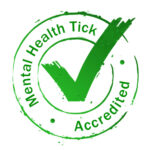The development of the Mental Health Tick was led by Richard Daniel Curtis. He recognised that there exists a wide range of solutions, training and approaches in the mental health sector. With this diversity there was a risk of multiple workplace accreditation schemes recognising elements of the good practice, but skewed towards the methods suggested by that particular organisation.
The Mental Health Tick is an independent accreditation scheme that views all of these different methods and approaches as part of the solution, but not the only solution, for organisations seeking to be mental health aware.
The phrase mental health aware is used specifically – it is virtually impossible for any organisation to be mental health friendly, it takes just one person to make it an unfriendly environment.
Taking evidence-based models of good practice, items were written to capture those in organisations. Sources used include:
- ACAS
- Health and Safety Executive
- Mental Health Foundation
- National Institute of Clinical Excellence
- Thriving at Work Leadership Council
- World Health Organisation
Items were developed in such a way that they could be measured. Criteria were then written for each item that would allow an organisation to be graded as Bronze, Silver or Gold. Lists of suggested evidence were also developed in order to facilitate the collection of evidence.
Items were split into three categories:
- Awareness – these items relate to how aware the organisation is of the importance of mental health, covering topics like strategy, policy and health and safety.
- Culture – these items relate to how mental health awareness translates into action and the feel of the organisation. For example, an organisation may have signed a mental health charter, but if the staff do not feel supported by their managers, then it doesn’t mean anything.
- Training and Development Provision – these items relate to the provision of services, resources and training across the organisation.
Post-pandemic Review 2021
Given the impact of the pandemic Twelve professionals from various sectors gave feedback on the documentation. These included:
- Amendeep Kaur Heer, Wellbeing and Engagement Officer, Southampton City Council
- Bethany Rodgers, HR Manager, People Development, University of Sheffield
- Emily Faulds, OD Adviser, Staff Wellbeing, University of Sheffield
- Dr Emma Thurston BM BCh (Dist), MA (Oxon), MPH (Dist), DipIBLM
- Helena Hopkins, OD Adviser, People Development, University of Sheffield
- Jayne Carrington, Health & Wellbeing Consultant
- Professor Neil Greenberg, King’s College London
- Dr Roxane L. Gervais, CPsychol CSci AFBPsS, British Psychological Society
- Susanna Lawson, CEO/Co-founder, OneFile
Their feedback resulted in 44 changes to the application process and assessment criteria. These can be viewed here:
